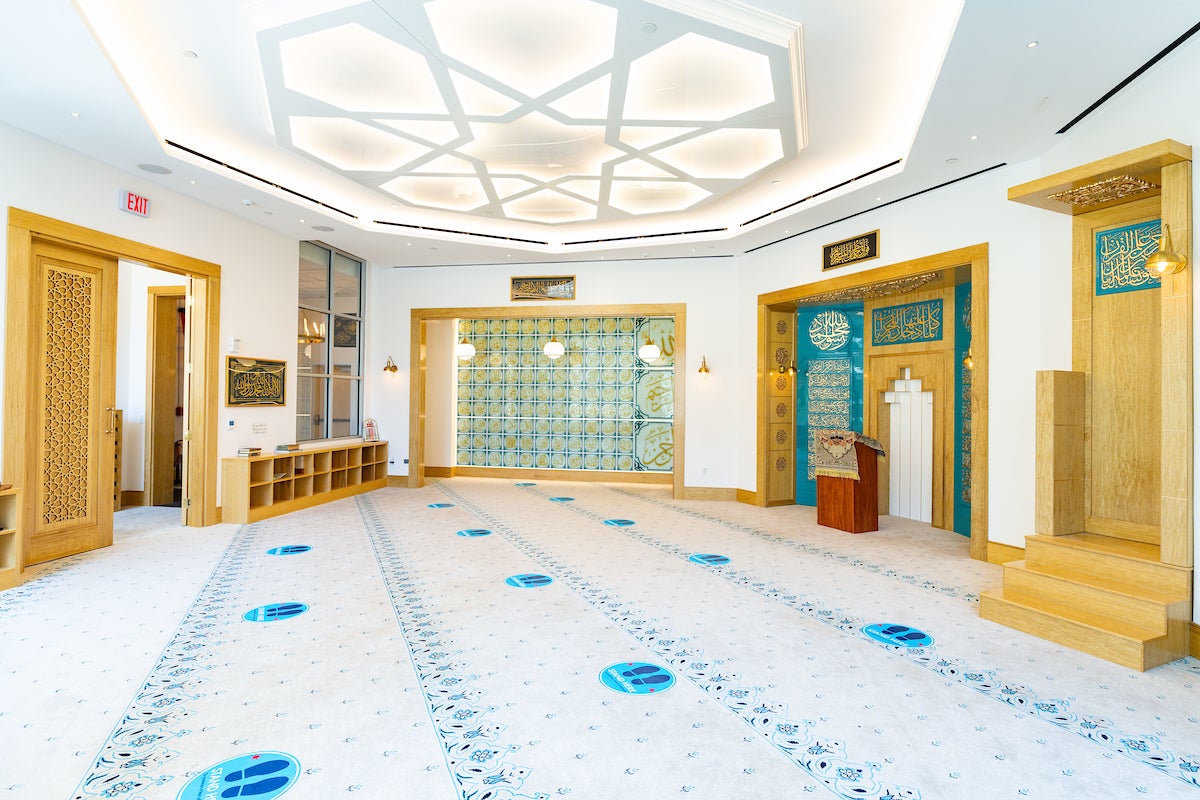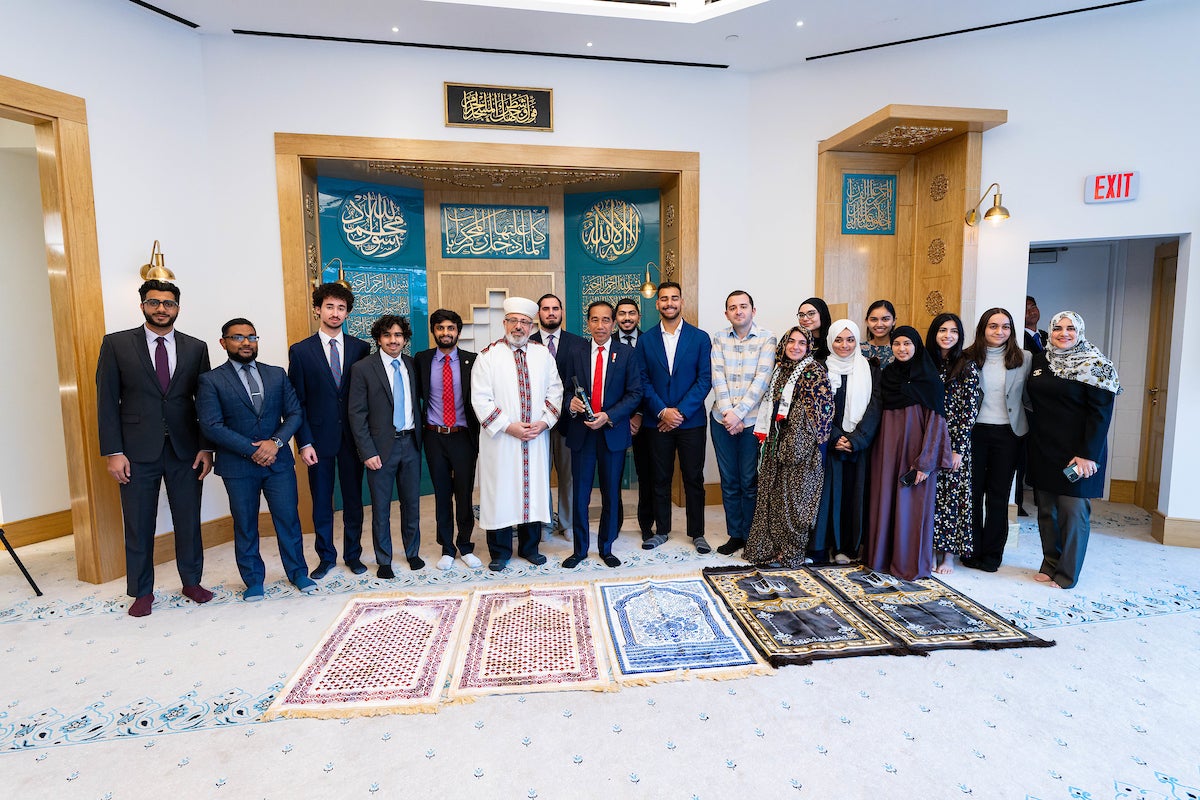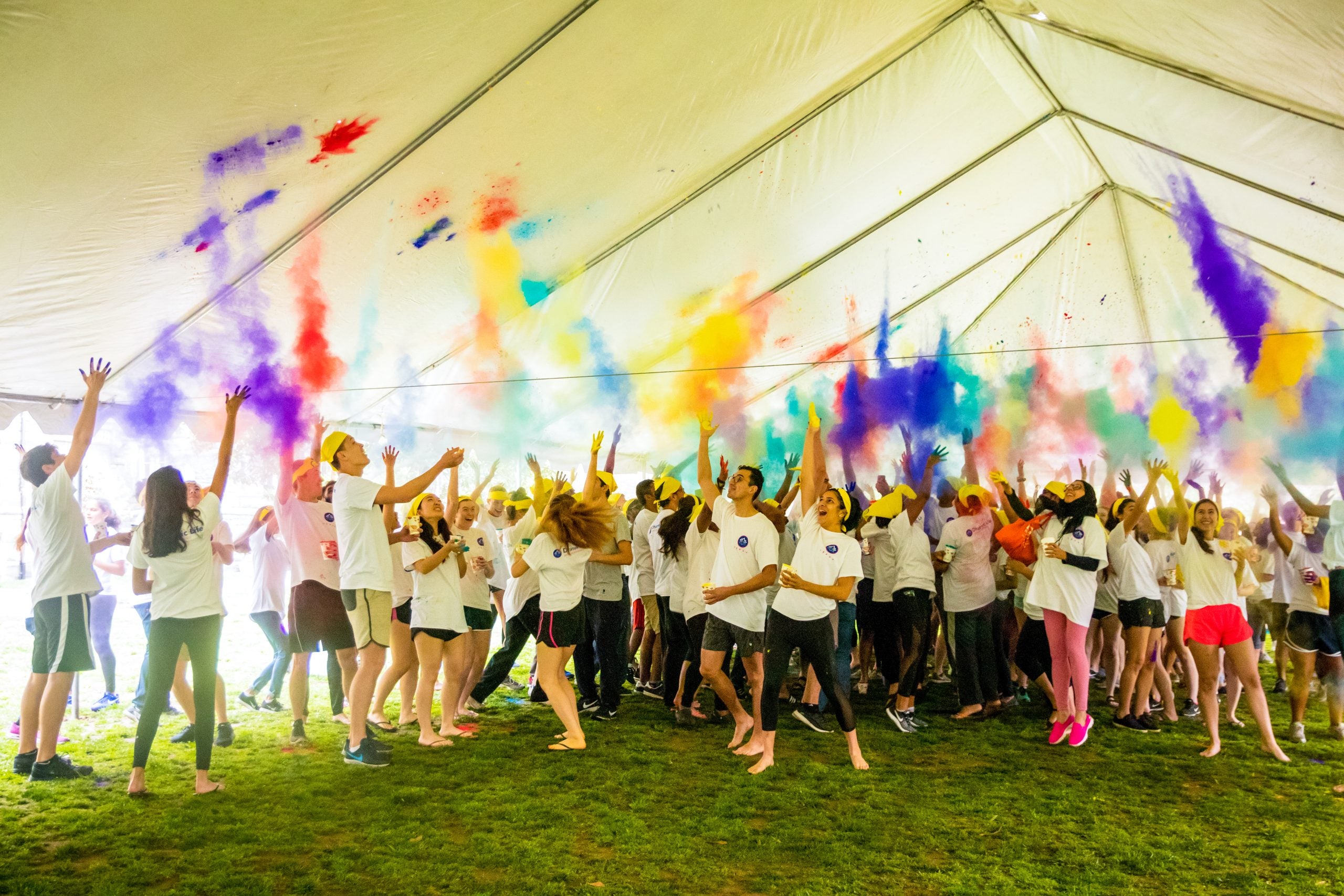‘A Time for Community’ – Georgetown Muslim Couple Reflects on Ramadan and Eid
Abrar Omeish and Umar Shareef met at Georgetown University during Ramadan in 2022. Omeish completed the dual degree Master in Public Policy/Juris Doctor program, offered in partnership by the McCourt School of Public Policy and Georgetown University Law Center, in December 2023, and Shareef is a doctoral student in the Arabic & Islamic Studies program in the Graduate School and serves as a teaching associate.
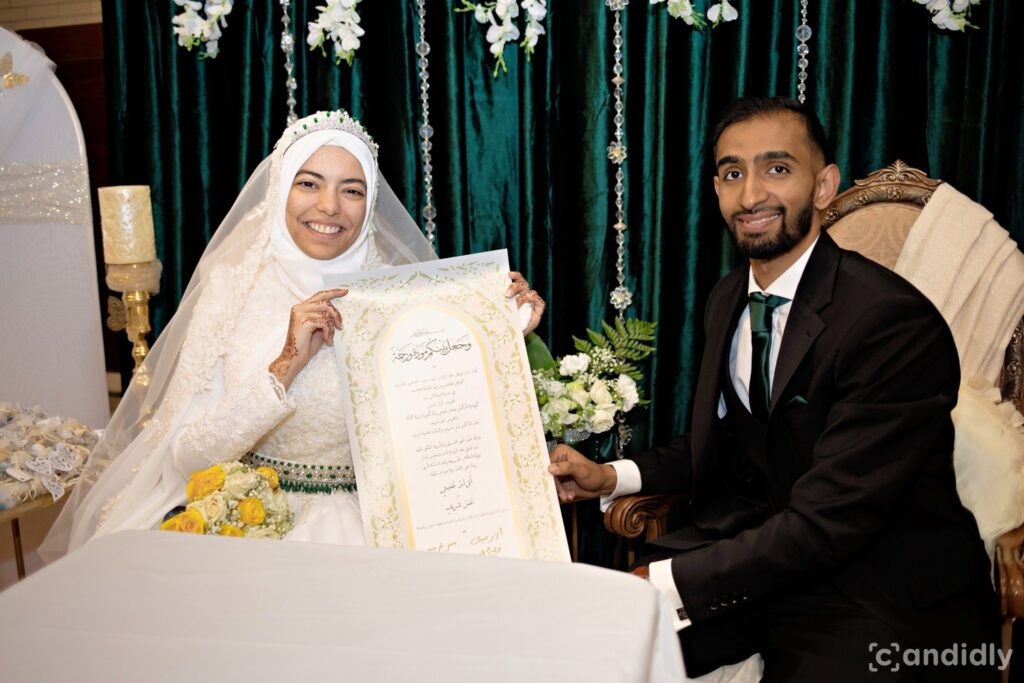
Abrar Omeish (left) and Umar Shareef (right) at their wedding ceremony
Two years later, they are married and excited to celebrate Ramadan as a couple. They met at the Yarrow Mamout Masjid, which is the result of decades of advocacy by students and staff on campus. In the late 1980s, Omeish’s father, a double Hoya, co-founded the Muslim Student Association and first Muslim prayer space on campus, which was in the basement of Copley Hall.
The couple met when Shareef was a leader for a series of night prayers called taraweeh. The two would pray and later meet up near Old North Hall to chat and get to know each other. “We are ultimately grateful and indebted to Georgetown for facilitating spaces of faith and community that helped us nurture our hearts alongside our souls and minds,” said Omeish.
Explore this couple’s individual experiences of Ramadan and how they celebrated Eid Al-Fitr growing up.
Building a Faith Community
Omeish: “Ramadan is not a festival or holiday, nor is it merely a time for community, iftars or feasts. People spend all day and night worshiping – it is normal to find Muslims in the mosque at 11 p.m. or awake at 5 a.m. During the last ten days, people begin praying in the mosque as early as 3 a.m. through sunrise: some even live in the mosque and worship every hour.
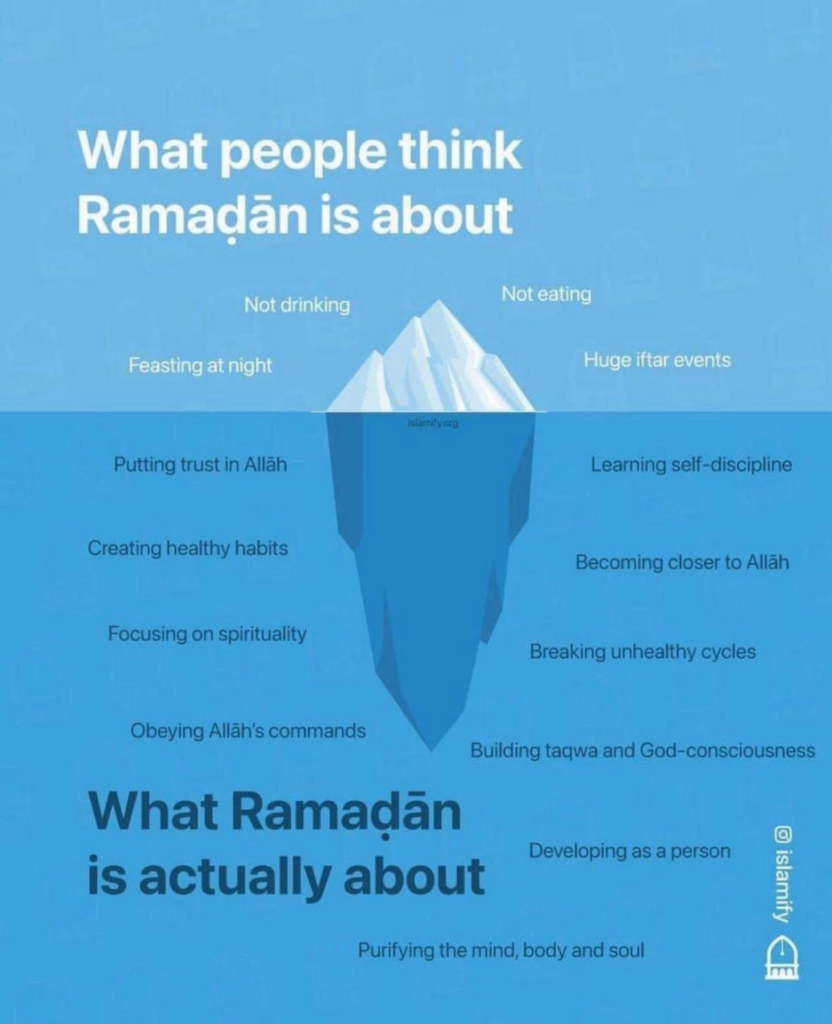
Fasting is a pillar of our faith, and our worship throughout the nights and days of the holy month serves as practice for self-discipline toward what is good for us, rather than what our whims or desires draw us toward. Ramadan is an annual spiritual detox where we reconnect with divine guidance to ensure we are devoted to what matters in our lives, and that our actions reflect those intentions. It is an opportunity to set goals, rectify our wrongs and reorient ourselves toward God in all that we say and do for the 11 months to come.
I’m proud to be part of a faith that I share with nearly 1/4 of the global population and can be found in nearly every country around the globe. Being Muslim gives me a coherent pursuit of truth that carries meaning because it is rooted in our Creator, and that informs a productive path for me as a member of a broader community seeking to establish justice in our society. Islam balances rationality and love to inspire justice and dignity for all people.”
Shareef: “Ramadan is so much more than just fasting: it is also the month of the Quran. I memorized the Quran in undergrad and have always felt a profound connection to it during this holy month.
Although the community fasts during the month together, it is the daily recitations of the complete Quran as a community during the optional night congregational prayer that resonate most deeply for me. It is a time for introspection, a journey that is not just about discipline but about reconnecting with the unchanging wisdom of the divine word.
This rediscovery of core values and purpose is what makes Ramadan so transformative. I emerge feeling not only spiritually enriched but with a renewed sense of direction.”
Ramadan is an annual spiritual detox where we reconnect with divine guidance to ensure we are devoted to what matters in our lives, and that our actions reflect those intentions.
– Abrar Omeish
Enjoying Eid, the End of Ramadan
Omeish: “We typically celebrate Eid by waking up early to get ready: we shower, put on new clothes, greet one another warmly, eat a date to start the day and repeat “takbeerat” – expressing gratitude and praise to God, stating clearly that we answer his call – throughout the morning and during the rest of the day. After taking a family picture and exchanging gifts, we go to Eid prayer. There are usually hundreds of people there: it is a special prayer performed only on Eid. Congregants repeat the “takbeerat” sentences together and are then led in a short prayer followed by a khutba (or sermon).
Eid prayers are usually early (sometimes 6 a.m.), and they run every hour through the early afternoon, depending on the mosque that is hosting. After prayers, many families go out for brunch. Afterward, we would visit or call our friends and families, both near and far, to say “Eid Mubarak,” which means “Have a Blessed Eid.”
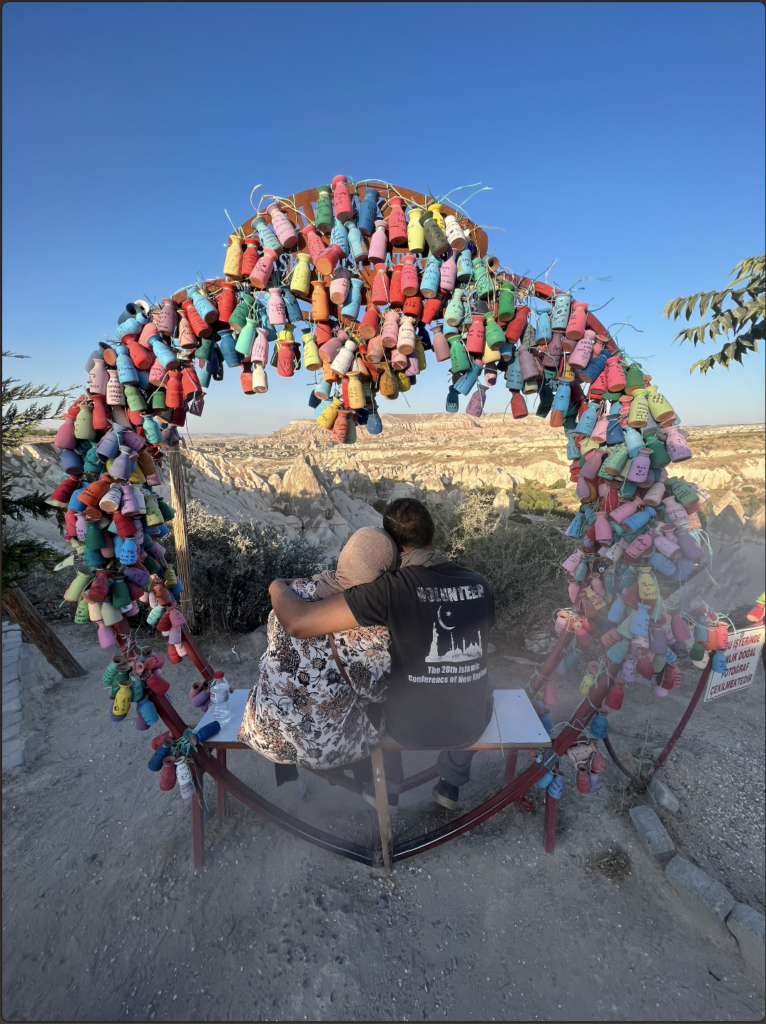
Omeish (left) and Shareef (right) sit together looking out at a desert
In the evening, we have a large family dinner. My family was lucky because my dad’s side were all local to Northern Virginia, so we reserved a restaurant or party venue and enjoyed each other’s company in our nice new clothes and took a huge family photo (100+ people!).
For those who don’t have family nearby, the mosque community normally has an Eid festival or celebratory function. If not done on that same day, families typically do something that weekend and mosques will almost always have festive programming as well, including a toy drive in advance of Eid to donate gifts for children.
Notably, Eid Al-Fitr, meaning the celebration (Eid) of breaking fast, marks the end of Ramadan – all the fasting, worship, prayer, devotion and giving – that people partake in, so it’s an exhausting month full of sacrifices. Eid is also the celebration of all that we accomplished. This is different from Eid Al-Adha which comes after the pilgrimage.”
Shareef: “Growing up, Eid meant joyous mornings in Maine with my family. We would rise before sunrise, and, after showering and dressing, would chant a chorus of pre-dawn prayers.
Dressed in our finest, sometimes new for the occasion, we would head to the mosque for the morning Eid prayer at 8 a.m. More than once, my dad would deliver the Eid sermon. After the service, we greeted people within the community and hugged one another. Everyone would be united in celebration. The mosque itself transforms into a vibrant community center where families share sweets and breakfast, and there would be a colorful spread laid out on the floor.
As we ate and drank tea, some of us would recount our Ramadan experiences. The rest of the day would then be spent in delicious feasts – sometimes devouring donuts at the local, nationally renowned donut shop (Holy Donuts), and other times barbecuing with family by the ocean.
Eid is, and always will be, a joyous occasion, a time to reconnect with loved ones and forge new bonds within the community.”
